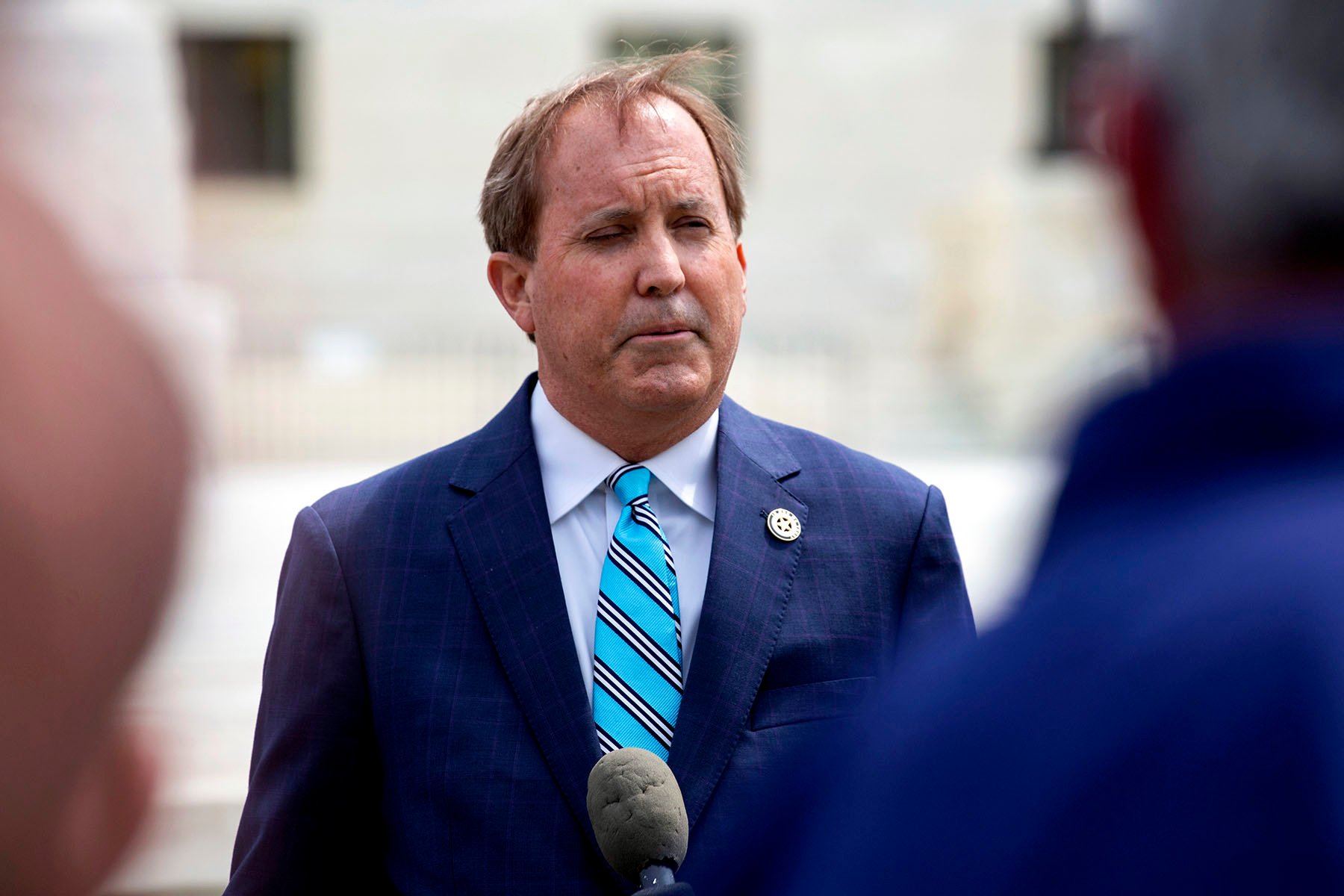Texas is suing the largest college sports governing body in the country in the hopes that a court will order the organization to “immediately begin screening the sex of student athletes.” Although the National Collegiate Athletic Association (NCAA) has already barred transgender women from playing in women’s sports, Texas’ attorney general has accused the group of using loopholes to allow such competition.
The state attorney general, Ken Paxton, is asking for a temporary injunction that either orders the screenings or requires that the NCAA and its affiliates immediately stop using the terms “women,” “female,” or “girl” to market any of its women’s sports teams or competitions.
The lawsuit comes at a time when more women student-athletes are being scrutinized for their height, athletic ability and physical characteristics as evidence that they are transgender. Amid an increasingly hostile political environment for trans people, those often false accusations lead to harassment and national media attention for both cisgender and transgender girls. This dynamic played out on a larger scale in the 2024 Olympics, as women’s boxing champions endured global scrutiny about their gender from billionaires and powerful political figures.
The NCAA announced this month that only cisgender women can compete in women’s school sports, although trans girls and women are still allowed to join women’s practices. This policy followed President Donald Trump’s executive order threatening to withhold federal funding from schools that allow trans girls on girls’ teams.
But in Texas’ view, the NCAA isn’t following Trump’s order — in part, because the organization acknowledges transgender identity at all. Since the NCAA acknowledges gender identity to be “an individual’s own internal sense of their gender” and defines sex assigned at birth as a designation given by doctors on an infant’s birth record, Texas argues that trans girls with updated birth certificates are still able to join women’s sports competitions.
The NCAA disagrees.
-
Read Next:
“The policy is clear that there are no waivers available, and student-athletes assigned male at birth may not compete on a women’s team with amended birth certificates or other forms of ID,” the NCAA said in an emailed statement to The 19th. The organization added that co-ed practice “has been a staple in college sports for decades, particularly in women’s basketball.”
The NCAA did not provide further comment on Texas’ demands. A sex-screening policy, if it were put into place, would impact over 500,000 student-athletes across the country — in sports like golf, tennis, swimming, and lacrosse — and potentially expose them to invasive exams or require them to submit to genetic testing. The NCAA has given no indication that it intends to pursue such screenings.
Sex testing in elite sports has a long history of being used to deny women entry into athletics based on their hormone levels — which vary widely across both cisgender and transgender women — and of exposing them to abusive practices, particularly in the Global South. Due to that risk, sex eligibility tests run into legal issues relatively quickly. Many techniques have been used and discarded over the decades due to being found invasive or prone to error.
The civil rights group Human Rights Watch, which released a comprehensive report on sex testing in international sports in 2020, says these tests “violate fundamental rights to privacy and dignity,” and that sport governing bodies that implement them create “environments that coerce some women into invasive and unnecessary medical interventions as a condition to compete in certain events.”
Although Texas’ attorney general does not provide many details of what sex-screening student athletes should look like, the lawsuit suggests screening for the SRY gene as one potential avenue. The SRY gene, which is found on the Y chromosome and is responsible for triggering testes development, requires a laboratory setting to analyze a blood or saliva sample.
However, as BBC Sport reported last year, human genetic variations are so varied that some experts say it’s not possible to establish that everyone with a Y chromosome was born male, and everyone without a Y chromosome was born female. Comprehensive testing — which includes analyzing the SRY gene and hormone levels — is expensive, requires niche experts, and causes ethical concerns, one expert told the BBC.
“This assessment can be humiliating. It includes measurements of the most intimate parts of anatomy, like the size of your breast and your clitoris, the depth of your voice, the extent of your body hair,” Alun Williams, who researches genetic factors related to sport performance at the Manchester Metropolitan University Institute of Sport, told the BBC at the time.
Texas previously sued the NCAA in December for “engaging in false, deceptive, and misleading practices by marketing sporting events as ‘women’s’ competitions only to then provide consumers with mixed sex competitions where biological males compete against biological females.” The state sought civil penalties and for a judge to bar the NCAA from allowing trans women to compete in women’s sport competitions in Texas or involving Texas teams.
Now, Texas is seeking much broader action: The new lawsuit does not specify that the court act only within the state’s borders.
-
Read Next:
“The NCAA’s sleight of hand is designed to intentionally deceive consumers into believing that biological men are no longer allowed to participate in women’s sports,” Paxton said in a statement on Thursday, when the new lawsuit was announced. “Far from aligning with President Trump’s executive order or basic reality, the NCAA’s new policy treats sex as a changeable characteristic determined by a birth certificate instead of biology.”
InterAct, a group that advocates on behalf intersex youth — who are born with differences in their reproductive anatomy or sex traits — opposes sports restrictions based on definitions of sex that rely on reproductive biology and genetics at birth. It is unclear how these rules will be interpreted for intersex students, the group says. When Republicans in Congress proposed to ban trans girls from girls’ sports in federally-funded K-12 schools, interACT said such a ban would subject intersex students to “discrimination and violations of their privacy and dignity that can cause lasting damage.”
“Any form of enforcement raises massive privacy concerns for students, in addition to inviting harassment, invasive questioning and stigma that can be deeply harmful to youth,” interACT said in a statement.
Meghann Burke, executive director for the labor union that advocates for professional women’s soccer players, told BBC News on February 5 that Trump’s executive order does not protect women in sports. It is a cynical political strategy designed to distract from the issues that actually affect Americans, she said — and that strategy tries to force athletes to comment on an issue that few people know anything about.
But questioning women’s eligibility in sports based on their athleticism and their physique is nothing new, she said.
“Here’s what we do know: women’s sports, as a concept, as a category itself, was born out of exclusion,” she said. “As women’s sports advocates, in women’s sports, we ought to be really careful before we start going about excluding people.”







